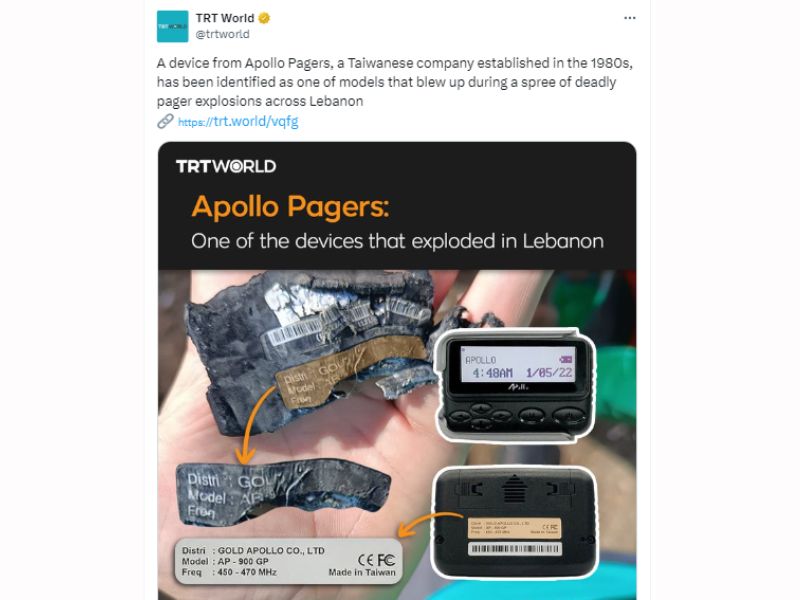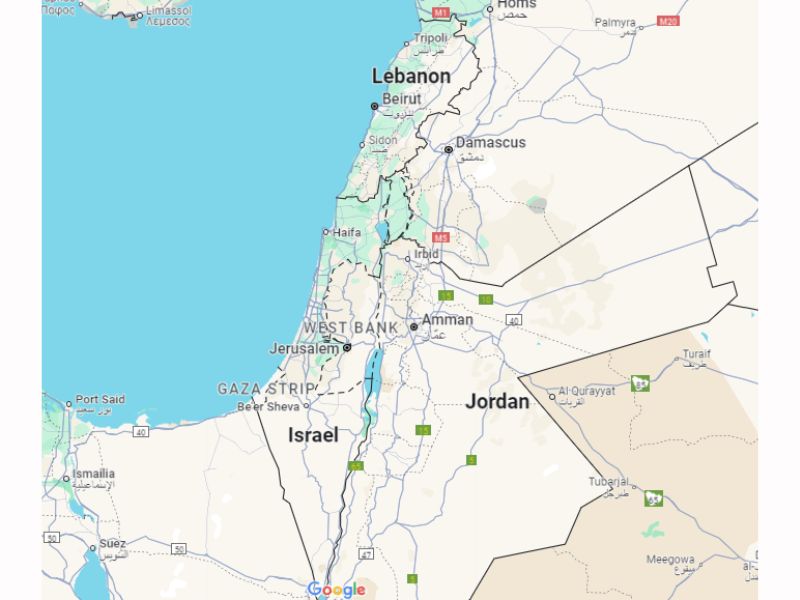By: Sanyukta Dharmadhikari
September 18 2024
 A viral video captured the moment a bag carried by a man exploded in a supermarket while he was shopping for fruit in Beirut. (Source: X/Screenshot)
A viral video captured the moment a bag carried by a man exploded in a supermarket while he was shopping for fruit in Beirut. (Source: X/Screenshot)
Nine people, including an eight-year-old girl, were killed, and nearly 3,000 were injured after handheld pagers used by members of the Iran-backed militant group Hezbollah detonated almost simultaneously in Lebanon on Tuesday, September 17. Iran's ambassador to Lebanon, Mojtaba Amani, was among the injured.
Soon after the explosions, several theories emerged online about how these low-tech communication devices detonated simultaneously and how the attack was carried out. Here’s what we know so far.
The explosions began around 3:30 p.m. GMT in the Danieh suburb of Beirut and the eastern Bekaa Valley, both known Hezbollah strongholds. Visuals of the blasts quickly went viral on social media, with one showing a man shopping for fruit at a supermarket when his bag exploded, leaving him crying in pain. Other footage showed people with injuries to their hands, faces, and waists.
Hezbollah has accused Israel of carrying out the attack and vowed retaliation. The Lebanese government called it a “criminal Israeli aggression.” While Israel has not commented, CNN reported that the operation was a joint effort between Mossad, Israel’s intelligence agency, and the military.
A popular theory online suggests that the explosions were triggered by a cybersecurity breach—using a code or command that caused the pagers' lithium-ion batteries to overheat and explode.
Pagers are wireless portable communication devices that operate on radio waves and were widely used in the 1980s and 1990s before mobile phones became common. They typically have a small screen that displays short messages, usually a number to call back.
However, experts told Reuters that the visuals of the explosions appeared "inconsistent" with previous cases of battery explosions. Paul Christensen, a lithium-ion battery safety expert at Newcastle University, told the news agency that such devices usually catch fire before exploding, which was not observed in any of the footage.
Rejecting the cyberattack theory, former U.S. National Security Agency analyst David Kennedy told CNN that the explosions appeared “too large” to have been caused by a hack that triggered the overheating of lithium batteries.
A report in The New York Times quoted officials suggesting that explosives were planted in the pagers supplied to Hezbollah, a theory echoed by other experts. The report added that in each pager, an explosive was placed next to the battery, along with a switch to enable remote detonation. Officials said the devices received a message, which triggered the explosions.
Commenting on the possibility of a “supply chain attack,” David Kennedy said the devices could have been fitted with explosives that detonated upon receiving a specific message.
Reuters quoted a senior Lebanese source who claimed that Israel likely modified the pagers at the production level. The source accused Israeli intelligence agency Mossad of “injecting a board with explosive material” inside the devices, which detonated after receiving a code. The source told Reuters that this code was sent to around 3,000 pagers across Lebanon, triggering the simultaneous explosions.
Deepa Kundur, a professor of electrical and computer engineering at the University of Toronto, told Bloomberg that current information points to a “supply chain deployment.” She suggested that the explosive could have been added during manufacturing, allowing it to remain inside the devices for months before detonation.
Some social media users claimed that the pagers were made by the U.S. firm Motorola. However, images of the exploded devices shared online showed the word "GOLD" on them. Gold Apollo, based in Taiwan, is one of the world’s leading pager manufacturers.

(Source: X/Screenshot)
Speaking to the Associated Press, a Hezbollah operative said the pagers that exploded were of a new brand that had not been used before. Reports suggest the devices were ordered months ago.
The Lebanon-based militant group Hezbollah has reportedly been using low-tech pagers to avoid Israeli surveillance. The group, which is backed by Iran, has voiced support for Palestine amid the current Israel-Hamas war, which began after the October 7 attack. Over the past few months, cross-border fire between Israel and Lebanon has been frequent.
 (Source: Google Maps)
(Source: Google Maps)However, Gold Apollo stated it did not supply the pagers to Hezbollah. Hsu Ching-Kuang, founder and president of Gold Apollo, told the media shortly after the attack that the AR-924 pager models in Lebanon were not manufactured by his company but outsourced to BAC Consulting, reportedly based in Budapest.
The Hungarian company was allowed to use Gold Apollo’s brand and trademark, but the “design and manufacturing of the products are entirely handled by BAC,” Gold Apollo said in a statement, as reported by Reuters.
Another social media user claimed the American University of Beirut Medical Center had replaced the pagers for its doctors and staff two weeks ago, hinting at U.S. involvement in the attack. However, the university denied the allegations, stating that its “paging system infrastructure was upgraded in April 2024,” and the “Go-Live for switching to the new system took place on August 29, 2024.”
The pagers exploded a day after Israel stated that "halting Hezbollah attacks is now a war goal" for the country, warning of a "wider military operation" against the Iran-backed group.
Several reports have noted that Israel has a history of conducting such "remote explosions." In 1996, Hamas bombmaker Yahya Ayyash, also known as "The Engineer," was killed when his cell phone, fitted with an explosive, detonated after he answered a call from his father.
Earlier this year, Iran accused Israel of assassinating Hamas leader Ismail Haniyeh in Tehran. While Israel did not claim responsibility, following the October 7 attacks, Mossad’s chief had vowed to "kill all Hamas leaders" in retaliation. The assassination sparked renewed conflict between Iran and Israel, with tensions continuing to simmer.
The series of explosions is likely to escalate tensions between Lebanon and Israel. The two countries last fought an open war in 2006, but skirmishes and cross-border attacks have increased since the October 7 Hamas attack on Israel.